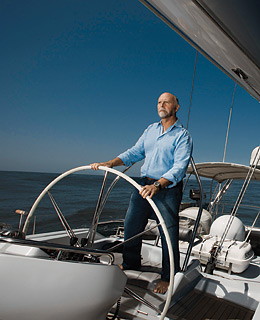
J. Craig Venter
When it comes to creatures living in the oceans, I, like most people, have always been enthralled by the popular favorites such as whales, polar bears and sea otters. It takes a special person to appreciate that there is just as much wonder to be found in the ocean's smallest and humblest organic forms—the microbes, genes and proteins without which the more charismatic creatures wouldn't exist at all.
J. Craig Venter, 60, a former National Institutes of Health physiologist, who led the effort to sequence and publish the human genome in 2001, is one such person. Through the institute that bears his name, he is sponsoring the second of two global expeditions by the research ship Sorcerer II to sample microbes and proteins throughout the world's oceans and seas.
The entire planet is inhabited mostly by microbes and relies on them to recycle waste, to create the raw materials that support healthy ecosystems and to keep the atmosphere in balance. The study of the evolution of these organisms has helped us develop new pharmaceuticals and other products and taught us much about genetically engineering new cures and treatments.
The Sorcerer II's journeys have so far yielded a database of 6.3 million genetic base pairs and 1,700 new families of proteins, not to mention 150 new species of microbes in waters off Bermuda that were once considered a biological desert—and the searching and counting is nowhere near complete. Biodiversity is our planet's greatest treasure. Through Venter's work, we may inch closer to protecting our whole planet, including those residents that are not big and warm and fuzzy.
Cousteau is founder and president of Ocean Futures Society and a passionate advocate of ocean preservation